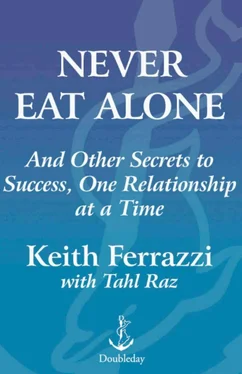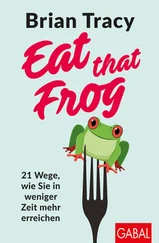Keith Ferrazzi - Never Eat Alone
Здесь есть возможность читать онлайн «Keith Ferrazzi - Never Eat Alone» весь текст электронной книги совершенно бесплатно (целиком полную версию без сокращений). В некоторых случаях можно слушать аудио, скачать через торрент в формате fb2 и присутствует краткое содержание. Год выпуска: 2005, ISBN: 2005, Издательство: C U R R E N C Y • D O U B L E D A Y, Жанр: marketing, на английском языке. Описание произведения, (предисловие) а так же отзывы посетителей доступны на портале библиотеки ЛибКат.
- Название:Never Eat Alone
- Автор:
- Издательство:C U R R E N C Y • D O U B L E D A Y
- Жанр:
- Год:2005
- ISBN:0-385-51529-4
- Рейтинг книги:4 / 5. Голосов: 1
-
Избранное:Добавить в избранное
- Отзывы:
-
Ваша оценка:
- 80
- 1
- 2
- 3
- 4
- 5
Never Eat Alone: краткое содержание, описание и аннотация
Предлагаем к чтению аннотацию, описание, краткое содержание или предисловие (зависит от того, что написал сам автор книги «Never Eat Alone»). Если вы не нашли необходимую информацию о книге — напишите в комментариях, мы постараемся отыскать её.
Never Eat Alone — читать онлайн бесплатно полную книгу (весь текст) целиком
Ниже представлен текст книги, разбитый по страницам. Система сохранения места последней прочитанной страницы, позволяет с удобством читать онлайн бесплатно книгу «Never Eat Alone», без необходимости каждый раз заново искать на чём Вы остановились. Поставьте закладку, и сможете в любой момент перейти на страницу, на которой закончили чтение.
Интервал:
Закладка:
One lesson we learned from the experience is that your PR campaign has to be realistic. More often than not, you will have to start small. You'll be forced to focus on your local paper, high school and college newsletters, or industry trade journals. Or perhaps just a white paper listed on some consulting company's Web site. The point is to light the fire.
When the white paper was completed, it received amazing publicity thanks to KPE's PR engine (which, unlike us, they could afford), and we indeed came out as the instant leader of the space. As an interesting side note, I subsequently recruited both Matt and Jane into YaYa (I wanted the founders of advergaming in my organization).
It took less than a year for us to appear on the cover of BrandWeek, in the marketplace section of the Wall Street Journal, in the technology section of the New York Times, in a feature for Forbes ... the list goes on. I was consistently on every panel with the competition (generally I was invited for free while "the boys" paid for the opportunity). While money can certainly be a substitute for good PR, it's hard to have enough of it to offset the credibility one gets from just one article in Forbes or the New York Times.
The competition, on the other hand, got little press and failed to create a distinct message. It all goes back to your content. Once you have it, you can begin to mold it in a way that will capture attention. You need to impart a sense of urgency and make the message timely. Reporters continually ask, "But why is it important NOW?" If you can't answer that sufficiently, your article will wait.
In YaYa's case, I highlighted how the games industry is the fastest-growing segment of the entertainment business and how surprisingly no one had figured out how to tap into that growth for anything other than pure fun and leisure. That isn't always enough. I had written a piece for the Wall Street Journal's weekly column called the Manager's Journal. The editor liked the piece but kept pushing it back so he could publish other pieces that were timelier. So I began to rewrite the intros to my piece each week, to relate to something that was in the news at the time. In short order, the article finally saw the light of day.
Once you light a fire and get the buzz going, you want to get your story in front of journalists. The misconception is that you have to "work" the press. But overeager PR professionals, who don't know the meaning of "No," are working reporters hourly. Journalists get fed up with people who are nitwits and pitch articles without substance. The media is like any other business. They have a job to do. If you can help them do their job better, or easier, they're going to love you.
You have to start today building relationships with the media before you have a story you'd like them to write. Send them information. Meet them for coffee. Call regularly to stay in touch. Give them inside scoops on your industry. Establish yourself as a willing and accessible source of information, and offer to be interviewed for print, radio, or TV. Never say, "No comment."
To illustrate: I remember the first time I, as the newly minted project leader of Deloitte's reengineering efforts, sat with one of Fortune's top journalists, Tom Stewart. My PR firm introduced Tom and me, and I came ready to impress. I had read every piece he had written in the last five years. I playfully gibed him about obscure predictions he had made years ago in other articles, and was prepared to thoughtfully discuss his most recent column. I wanted to be as useful as possible, giving him access to trends, ideas, and all the contacts at my disposal. I did the same thing for other journalists at other major newspapers and magazines.
Tom and I had a blast. Tom's energy and intellectual curiosity was contagious. I suppose I had something to offer him as well, because he readily took my next lunch offer and the next after that.
It was more than just mutual admiration. I was prepared to act, sound, and feel like an expert. When I didn't know something, I was sure to pass him on to the person who did. If you are constantly apologizing with "Well, I am not the expert," people will believe you and wonder why you wasted their time.
I never did ask Tom for anything in particular. We'd meet a few times a year and I'd try to be as helpful as possible. Sure, I remember the first time I saw one of my ideas in his column months after we had discussed it, and lo and behold, a competitor firm was quoted rather than Deloitte. I went through the roof. My instinct was to call him immediately and express my unhappiness. But, instead, I held back and simply invited him for another lunch.
Is such a thing too time-consuming? Not if you're convinced it behooves your company's efforts and if you enjoy the interaction. When I was at Deloitte and would show up on TV, I was Deloitte. When I was in Forbes, it was the company that reaped the benefits in business development.
Over time, the hours you put in developing relationships with journalists will pay off, as it did for me with Tom, both personally and professionally. Deloitte's name eventually started to pop up with increasing frequency in the pages of Fortune, because our stories were being heard by someone who could retell them. I never asked Tom for an article, but giving him good ideas in our lunches certainly didn't hurt. Today, Tom is the editor-in-chief of the Harvard Business Review, and I'm planning to take him to lunch soon to hear out a few more ideas. Remember, though, you can't force-feed or pressure a good journalist. Any attempt to do so will surely end your professional relationship. The best journalists are almost always also the most ethical.
In traversing the media landscape, be aware that there are also some land mines. Sometimes what media wants to write, and the story you think they should write, is a very different thing.
I learned this the hard way. One day I got a call from the wellknown reporter Hal Lancaster, who was writing a column about managing one's career for the Wall Street Journal. The story appeared Tuesday, November 19,1996.1 know the exact date because I had the article framed so I would never forget the lesson I learned.
When Hal called, I was ecstatic. He was a famous reporter for a prestigious newspaper asking about what I did. I was a relative kid at Deloitte. Well, that wasn't exactly the slant of the story, but my excitement got the best of me. Hal said he was doing a piece on the changing nature of work. He had a hypothesis that the end of the reengineering movement was having a major impact on those who had led reengineering projects and those who had been affected by the projects.
Rather than listen more closely to his angle, I tried to impress upon him what I thought the real story was about. Big mistake! If a reporter calls you, states his story and the angle he's taking, you can be sure you'll be used as an example to buttress his angle. Rare is the occasion that a journalist will hear you out and say, "Oh my God, you're right! I'm going about it all wrong." Rarely—I meant never. But back then, I thought I'd set Hal straight. He, however, ended up straightening me out.
I took a lot of time with Hal explaining how I had been on the normal partner track leading Deloitte's reengineering effort, but now that the trend was ending, I was transitioning into an exciting special project involving marketing. "I'm going to change the way traditional consulting companies market themselves."
He pushed past my excitement. "Do you feel displaced in the post-reengineering world?" he wanted to know. Sure, I conceded, there was some change involved, but certainly nothing traumatic. He wanted me to say I felt aimless. But my new gig excited me. I considered it a huge step up.
Читать дальшеИнтервал:
Закладка:
Похожие книги на «Never Eat Alone»
Представляем Вашему вниманию похожие книги на «Never Eat Alone» списком для выбора. Мы отобрали схожую по названию и смыслу литературу в надежде предоставить читателям больше вариантов отыскать новые, интересные, ещё непрочитанные произведения.
Обсуждение, отзывы о книге «Never Eat Alone» и просто собственные мнения читателей. Оставьте ваши комментарии, напишите, что Вы думаете о произведении, его смысле или главных героях. Укажите что конкретно понравилось, а что нет, и почему Вы так считаете.












